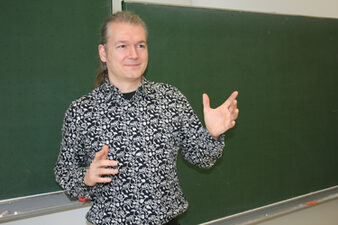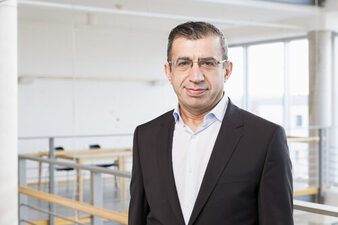About the project
The project, funded by the Federal Ministry of Education and Research for three years, aims to research the environmental behavior and environmental attitudes of Turkish and Russian-speaking migrants and to strengthen their commitment to climate protection.
Together with some networks and initiatives of migrants, the main aim is to spread the idea of sustainability in the communities.
These initiatives need support to expand and professionalize their work, which consists in particular of planning and evaluating measures to promote environmentally and climate-friendly behaviour based on scientific methods. A transdisciplinary research approach was chosen for the project, which integrates the project partners' views of the problem and knowledge gained from experience as well as practical actors both in the research and in the planning and implementation of intervention measures.
The EMIGMA team has developed the following project plan for the three years:
In the first phase, a representative survey in the form of standardized interviews will be conducted in the four regions of Dortmund, Berlin, Munich and Baden-Württemberg. This will evaluate environmental behavior, environmental attitudes and commitment in the three fields of action related to everyday life: mobility, housing and nutrition. Qualitative interviews deepen this knowledge further.
In the second phase, environmental psychological intervention measures (information, behavioral feedback, behavioral offers and incentives) are adapted to specific target groups and problems and their effects are recorded. This requires an environmental assessment of the behavioral effects, which the Heidelberg-based natural science research institute ifeu is ensuring for the EMIGMA project.
Recommendations for action to empower migrants
What is the connection between climate protection and integration? What motivates migrants to get involved in climate protection? What prevents them from doing so? EMIGMA provides answers to the question of how the commitment of migrants to environmental and climate protection can be promoted with scientifically sound recommendations for action.
The recommendations for action are based on the results of a representative survey, in-depth interviews and the evaluation of four pilot projects. In addition, practitioners were on hand to advise the EMIGMA project during the three-year project period and were interviewed on specific issues. The aim of the recommendations for action is to support actors from migrant organizations, environmental protection organizations, companies and other institutions in spreading the idea of sustainability in the Turkish and Russian communities. Furthermore, the recommendations for action address the various levels of administration and politics and show where framework conditions need to be designed in such a way that they support migrant and environmental protection organizations in their climate and environmental protection work.
The project, initiated by Prof. Dr. Marcel Hunecke (coordination) and Prof. Dr. Ahmet Toprak and funded for three years by the Federal Ministry of Education and Research, is currently in the second phase of research work (see graphic). The aim of the project is to gain knowledge about the commitment to climate and environmental protection, environmental attitudes and environmental footprints of migrants and to develop target group-specific measures for climate protection on the basis of these findings.
To date, there has been little reliable empirical evidence on the commitment to climate and environmental protection, environmental attitudes and environmental footprints of migrants. From the few exceptions, however, it could be concluded that their environmental knowledge and commitment to environmental and climate protection are less pronounced than among German autochthonous people. However, it is highly important to discover and promote the potential in these sections of society in order to anchor the idea of climate protection.
In the first phase of the project, 1600 Turkish and Russian-speaking migrants and 400 German autochthons (comparison group) in the four regions of Dortmund, Berlin, Munich and Baden-Württemberg were surveyed on their environmental attitudes and behaviour using standardized questionnaire interviews. Knowledge about individual CO2 balances, the so-called "ecological footprint", was determined using a CO2 calculator. This was co-developed and supervised by our project partner, the scientific research institute IFEU. In the second phase, the knowledge gained was further deepened through qualitative interviews.
The knowledge generated in the first two phases is intended to provide information on how the climate protection commitment of the population with a migration background living in Germany can be strengthened and how the idea of sustainability can be disseminated in the communities.
In the third phase of the project, all of this knowledge will be incorporated into the development of target group and problem-specific model projects. The aim is to promote the environmental and climate protection commitment of migrants. The pilot projects take place in close cooperation with practitioners. These are mostly volunteer-run networks and initiatives of migrants who are already committed to spreading the idea of sustainability. In order to support them in expanding and professionalizing their work, EMIGMA provides scientific support and evaluates the pilot projects.
Cooperation/project partners
The following partners are working together in DoNaPart under the leadership of the Faculty of Applied Social Studies at Dortmund University of Applied Sciences:
- ifeu - Institute for Energy and Environmental Research Heidelberg GmbH (Dipl. Phys. Udo Lambrecht, Dipl.-Ing. Frank Dünnebeil, Dipl.-Wirtsch.-Ing. Frank Kutzner)
- Tangere - Society for Intercultural Cooperation e.V., Berlin (Dr. Larissa Graf)
- Migrants for Agenda 21 e.V.
- Multicultural Forum e.V.
- Data4U - Society for Communication Research
- Turkish-German Environmental Center Berlin (Dr. Turgut Altug)
- BUND
- Yesil Çember at BUND Berlin e.V. (Dipl. Biol. Gülcan Nitsch)
- Association of socio-cultural migrant organizations Dortmund e.V. (Ümit Kosan)
- Verein Krone e.V., Dortmund (Leonid Korsunskiy, Irina Gusol)
Contact & Team
Management
Prof. Marcel Hunecke, Dr.
There will be no consultation hours during my sabbatical from 01.09.24 to 31.08.25.


